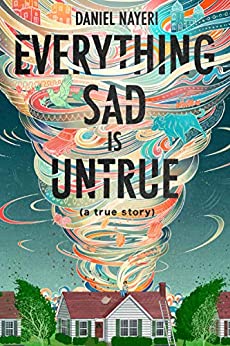
Daniel Nayeri
Reviewed by: Emma Nakhla
Everything Sad Is Untrue (a true story), by Daniel Nayeri. Levine Querido, 2020. Hardcover, 368 pages, $15.29 (Amazon). Reviewed by OP member Emma Nakhla, 18.
The title of this book is not a thesis statement. Daniel Nayeri’s true story about his childhood told in Everything Sad Is Untrue is compelling and beautiful, but it is filled with sadness and suffering that is far from untrue. However, the constant presence of faith in the story allows for the good news of the gospel to shine through, even in the saddest of moments.
In Everything Sad Is Untrue, the author narrates his own experience as a child, exchanging wealth in his home country of Iran for poverty in Oklahoma because of his mother’s unashamed Christian faith. Nayeri takes on the voice of his twelve-year-old self, explaining his experience to his classmates in America, and the authenticity is striking. Nayeri takes inspiration from A Thousand and One Nights, adopting the role of Scheherazade to tell “the king,” his reader, his story. At the start, the reader may find it difficult to look over the chasm between himself and Nayeri. The narrator details a life in Iran with vocabulary and cultural cues that are most likely unfamiliar to the average reader—and Nayeri does not hesitate to point this out often. Although in Oklahoma Nayeri is, at worst, severely traumatized and, at best, simply misunderstood, he takes pride in his heritage, and through the story allows the reader to truly see him—not a patchwork of myths and truth. The reader slowly feels the chasm between himself and the narrator narrow, as his understanding of Nayeri’s world and culture grows. This story is humbling, and at times uncomfortable, but important and deeply educational.
Nayeri’s life is ridden with tragedy, but he uses his misfortune as a gateway to explain his hope. Nayeri describes his mother as the hero of the story because of the godly influence she had on his life. Although tempted to feel hopeless and cynical throughout his trials, Nayeri gradually realizes that his mother chose to keep and share her faith because of her focus on eternity, and this in turn changes how Nayeri views his past.
Although Nayeri does not speak about the role faith plays in the story as often as he could, he does make its importance clear to the reader—it would be a completely different story otherwise. The language and tone of the book are befitting its middle-school narrator, as well as the intended audience—it is considered “Young Adult” fiction. Nayeri chooses to include each small tale, no matter how gross or upsetting, in order to weave his inspiring overall story.
Of course, contrary to the book’s title, the narrator understands that the sad things in his life are still true. Yet, although the reader will undoubtedly feel Nayeri’s pain throughout the story, he will leave the story not with the tragedy of Nayeri’s life weighing on his heart, but with joy in how Nayeri’s God works all, including the sad, for good.
November 09, 2025
November 02, 2025
October 26, 2025
October 19, 2025
October 05, 2025
Raising Sexually Faithful Kids and
Parenting Boys and Girls in a Gender-Confused World
September 28, 2025
Calvin’s Ecclesiology: A Study in the History of Doctrine
September 21, 2025
© 2025 The Orthodox Presbyterian Church